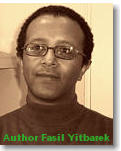Published in 2005 by Chicago-based Nyala Publishing, Fasil Yitbarek’s Texture of Dreams is a story about a young Ethiopian who immigrates to New York City in the last days of the Derg. The novel takes its main character Yosef Temesgen through various hurdles in New York City and a story of an Ethiopian Horatio Alger unfolds. In that sense, the book is a journey forward. However, the character’s frequent lucid and incoherent dreams return him to Dessie and Addis Ababa, unveiling his childhood, puberty, and adulthood in a country he finds mostly in his dreams. The transcendental aspects of the novel may explain the author’s title selection.
Thousands of Ethiopians lucky enough to obtain exit visas from an erstwhile friendlier U.S. Embassy staff have sniffled their way into Boeing 767s in the days of the Derg uncertain if they would ever see their country and loved ones again. Farewells to the old and sick were particularly difficult—forcefully separated embraces were common and the Bole scene frequently resembled a veritable lekso. Fasil’s opening chapter brilliantly captures the Bole rapture for many Ethiopians.
Yosef exits JFK airport clad in a thick sweater and coat in the middle of a sweltering 90° New York summer ready to begin the long process of becoming an American. He wades through rough New York seas thanks to his resilient and anchored personality cultivated in large part by his loving mother, a father whose morning prayers reverberate in his waking and slumber moments, by Abba Tsedalu—his Ge’ez teacher, his friends, and his neighbors in Dessie, and his experiences at Addis Ababa University. Indeed, what makes Fasil's work a great read is the constant juxtaposition it draws between modernity and nostalgia, each gracefully weaved into the narrative and told in prose reminiscent of great contemporary American writers such as Langston Hughes, Tom Wolfe and Philip Roth.
Yosef’s ability to revisit Ethiopia in his mind’s eye come at most unexpected times. Even wet snow triggers memories of the dry terrain of his childhood. Fasil’s seamless tale of an Ethiopian immigrant’s late-life struggles with the American intonation, securing employment, equal rights at the workplace, housing, alienation, loneliness, new friendships, love, romance, and sex are a pleasure to read. His character's ability to accept his awkwardness, regret his judgment calls, and also, relish his rare lucky breaks through self-deprecating humor allows us to simultaneously laugh and commiserate without end.
I couldn’t end this note without quoting Fasil’s tribute to the pains of Ethiopian motherhood:
I am lying in my bed, wide-awake, thinking of the many mothers I knew in Dessie. There is no holiday for them, no Mother’s Day to pay homage to their selfless love and endless toil.
What is life to a mother in the dust-choked,poverty-stricken town of Dessie? Work and pregnancy. Planned, unplanned. Wanted and unwanted conception of life through enjoyed, tolerated and often suffered union. Back to back pregnancies, some desired and others inflicted by the blind lust of a selfish husband who, indifferent to her failing health, their grinding poverty and the still unweaned infant, ignored her plea to be careful. Pregnancy. Morning sickness carefully concealed and discreetly born until the fetus expands, distending her belly like a taunt balloon, slowing her down despite the perpetual urgency of her chores. No reprieve to rest and tenderly stroke her life-encapsulating bulge because there is endless work and no else to do it. Life growing inside her, draining her sap through the navel chord, while the infant milks her dry. Nursing two helpless ones. Sweating for the man and the grown children. Work and pregnancy. Risking miscarriage from straining to life a bag of wheat to take to the mill. Work and work while the unborn kicks and its siblings wails on her back. Anguish and heartbreak whenever infant death snatches one for every survivor that defies it. Incessant abuse, verbal and physical, if the man is a travesty of humanity who thinks he deserves better than her. Work, pain, tears. Work, heartbreak, illness and despair! Work work work work until death comes to the rescue. Only when she is gone does the sorry ingrate finally discover her worth as his home begins to fall apart before she is cold in her grave. (Yitbarek, page 261-62).
Read Fasil's work to laugh (sometimes out loud), read it to cry (not always a bad thing), read it to pay homage to a country we left and one we embraced, read it for its Kidase, if anything, read it for its incredible prose.
 For cuz B
For cuz B
 For cuz B
For cuz B
